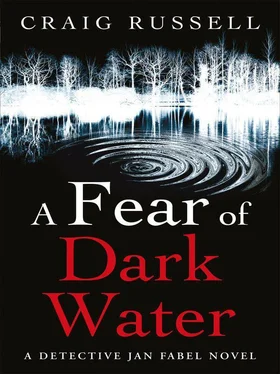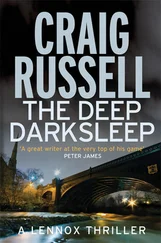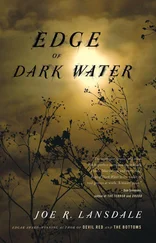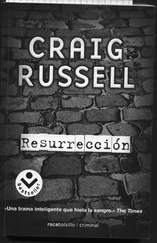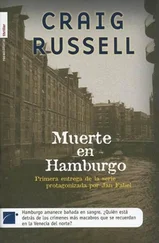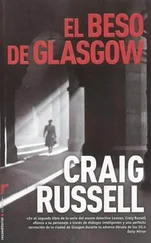Craig Russell - A fear of dark water
Здесь есть возможность читать онлайн «Craig Russell - A fear of dark water» весь текст электронной книги совершенно бесплатно (целиком полную версию без сокращений). В некоторых случаях можно слушать аудио, скачать через торрент в формате fb2 и присутствует краткое содержание. Жанр: Триллер, на английском языке. Описание произведения, (предисловие) а так же отзывы посетителей доступны на портале библиотеки ЛибКат.
- Название:A fear of dark water
- Автор:
- Жанр:
- Год:неизвестен
- ISBN:нет данных
- Рейтинг книги:5 / 5. Голосов: 1
-
Избранное:Добавить в избранное
- Отзывы:
-
Ваша оценка:
- 100
- 1
- 2
- 3
- 4
- 5
A fear of dark water: краткое содержание, описание и аннотация
Предлагаем к чтению аннотацию, описание, краткое содержание или предисловие (зависит от того, что написал сам автор книги «A fear of dark water»). Если вы не нашли необходимую информацию о книге — напишите в комментариях, мы постараемся отыскать её.
A fear of dark water — читать онлайн бесплатно полную книгу (весь текст) целиком
Ниже представлен текст книги, разбитый по страницам. Система сохранения места последней прочитанной страницы, позволяет с удобством читать онлайн бесплатно книгу «A fear of dark water», без необходимости каждый раз заново искать на чём Вы остановились. Поставьте закладку, и сможете в любой момент перейти на страницу, на которой закончили чтение.
Интервал:
Закладка:
‘Anna?’ Fabel snorted. ‘You’re way off there. For a psychologist, your insight stinks. But I will check with the office tomorrow and see if it was someone there who sent the text.’
Fabel realised that he was already approaching Stade. He hated talking on the phone while driving; even with hands-free he felt you were taken away from the road you were travelling. Particularly when trying to puzzle out who could have sent you a cryptic text message and why they had sent it.
‘Got to go. I’ll talk to you tomorrow,’ he said. ‘Sleep well.’
The sky had cleared a little and the sun was already low, painting the town of Stade red as Fabel approached it. He reflected that it was probably the only thing that had painted that particular town red for a long time: Stade was a sleepy, picturesque small town of canals, cobbled streets and gable-ended medieval buildings on the edge of the Altes Land — the Old Land — on the south side of the Elbe, about forty kilometres to the west of Hamburg. It was the kind of place that gave Fabel a sense of comfort. It appealed to the historian in him: Stade was over a thousand years old and one of the oldest settlements in Northern Germany. During the Middle Ages this small provincial town had been, in turn, a Swedish city, a Danish stronghold and a Hanseatic city-state in its own right. Now Stade was part of the Greater Hamburg Metropolitan Area, but nothing much seemed to change it and it stood, quiet, pretty and sedate on the banks of the River Schwinge, watching the passing of time and human follies with stately detachment.
Fabel cursed as he found himself passing through the town’s ancient centre. He had been to Muller-Voigt’s home, on the outskirts of the town, before and had not had to drive through the town to get there. Fabel had been sure he would have been able to find it without any trouble and had not bothered to key the address into the satnav. The truth was that Fabel hardly ever programmed the satnav. Something told him it was the most human thing to find your own way, and that quite often some of the best things happened to you, the best discoveries made, when you had lost your way.
Which was all well and good on a philosophical level, he thought, but not when you were late for an appointment with one of Hamburg’s most influential politicians.
He made his way through Stade’s pretty centre, out into the countryside and found his bearings, driving along a narrow, straight ribbon of road beside the high banks of a canal. The sun was filtered through the tops of the trees, squeezing through a letter box of clear sky between the flat landscape below and a parallel bank of dark cloud above. The trees thickened into a dense wedge at the side of the road and Fabel swung into the long drive that he knew led up to Muller-Voigt’s home.
It was just as Fabel remembered it: massive, imposing, modern, all angles and glass. And what wasn’t glass seemed to be faced with blue marble, although Fabel knew from his last visit that it was actually a facade made up entirely of solar panels.
It was the kind of place that the architects would use on all their publicity. A mixture of masterpiece and pension fund.
Muller-Voigt was dressed in chinos, a blue long-sleeved corded shirt with a white T-shirt underneath and canvas deck shoes. It was the most casual of outfits, but Fabel reckoned it had cost more than some of Fabel’s best suits.
‘Thank you for coming,’ the politician said as he opened the door. Fabel had the same feeling that he had had when the Senator had spoken to him in the Presidium’s elevator: that he was looking at a troubled man. Which was a disconcerting sight: Fabel had never seen Muller-Voigt troubled. In fact, he’d never seen him anything other than calm and relaxed. And totally in control.
Like a million other Germans, Fabel had seen and heard Muller-Voigt in many stressful situations. Hamburg’s Environment Senator was the kind of guest live TV and radio producers loved: he had an innate knack of being able to make statements that were both provocative and combative while maintaining a relaxed outward calm. It was a style that was simultaneously nonchalant and aggressive. And it made for great media interviews. Muller-Voigt seemed to thrive in an environment of conflict and his value to broadcasters was the adroit way he could light the fuse of other politicians. Interviews would end with his opponent seeming to lack self-control and self-assurance. Muller-Voigt made full and effective use of the truism that whoever loses their temper loses the argument. Muller-Voigt never lost either.
But tonight Fabel was seeing something different. Someone different.
Muller-Voigt showed Fabel into a huge living room, pine-lined with a double-height vaulted ceiling and a banistered gallery above. Just as he had the last time he had been here, Fabel was annoyed at the vague pang of petty jealousy he felt looking around the politician’s elegant home. Elegant but totally environmentally friendly. The house was making a statement: it was cool to be green.
They sat down on a large corner sofa facing the two-storey picture windows. The sun seemed tinged a different colour through the glass.
‘I can adjust it at will,’ said Muller-Voigt, as if he had read Fabel’s mind. ‘It’s the latest technology: energy-capture glass. It doesn’t just insulate and prevent the escape of warmth from the house, it actually captures solar power and converts it to energy.’
‘I see,’ said Fabel. ‘Very impressive.’
‘I know that many people — and I don’t know if you’re one of them — think this is all a bit of a gimmick with me. That I’m really more interested in the political than the natural environment. Normally I wouldn’t care what you or anyone else thought, but I need you to understand something, Herr Fabel: I am genuinely, completely and irreversibly committed to changing how mankind treats the environment. It’s more than a political belief; it’s how I see life.’
Fabel shrugged. ‘I have no reason to doubt that.’
‘Well, as I said, some do.’ There was a hint of bitterness in Muller-Voigt’s tone. ‘As a race, as a species, we’ve lost our way, Herr Fabel. And it’s going to be the end of us. In fact, we’ve lost our most basic capability to read Nature, the geography and climate around us. Take where we are right now.’ He waved a hand vaguely at the landscape beyond the windows. ‘I built this house on a geest — an island of sand and gravel dumped as moraine by the last ice age, in the middle of a flat sea of heath, marsh and moor. If you look around this whole area you’ll see that almost every town is built on a geest, Stade included.
‘When these settlements were first created, our ancestors were connected to Nature and to the landscape. They could read the signs and learn from experience of changing weather patterns. And that meant they knew where to build their homes. Do you know something? These geests have provided the perfect protection against storm surges for a millennium of settlement. The marshes around them work like huge sponges and the geests themselves are natural flood barriers. Giant natural sandbags. And you see all the Knicks that run alongside the canals and rivers here?’ Muller-Voigt referred to the turf embankments, topped by trees and bushes, that criss-crossed the Altes Land and much of the rest of the Northern German landscape. ‘Some of those Knicks are older than the pyramids of Giza, built by our ancestors more than five thousand years ago. And do you know something, they remain the best protection against aeolian and fluvial erosion this landscape has.’ Muller-Voigt gave a small laugh. ‘Look at the millions and millions of euros spent on flood defences for Hamburg. Don’t get me wrong, they’re needed to protect people and property — but if you look at the historical flooding patterns of Hamburg over the last century or so, you’ll see all of the areas that have remained immune. And guess what? They’re all the oldest settled parts of the city, on the Hamburg geest slopes. That’s what we’ve lost, Fabel. Connection.’
Читать дальшеИнтервал:
Закладка:
Похожие книги на «A fear of dark water»
Представляем Вашему вниманию похожие книги на «A fear of dark water» списком для выбора. Мы отобрали схожую по названию и смыслу литературу в надежде предоставить читателям больше вариантов отыскать новые, интересные, ещё непрочитанные произведения.
Обсуждение, отзывы о книге «A fear of dark water» и просто собственные мнения читателей. Оставьте ваши комментарии, напишите, что Вы думаете о произведении, его смысле или главных героях. Укажите что конкретно понравилось, а что нет, и почему Вы так считаете.
